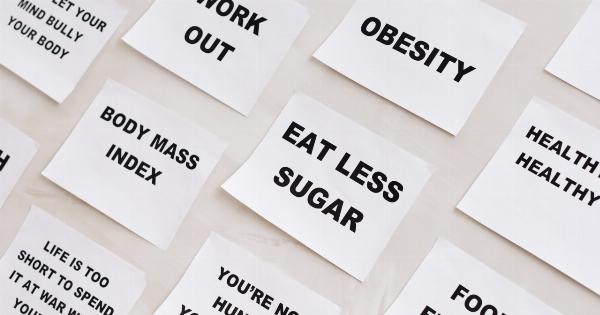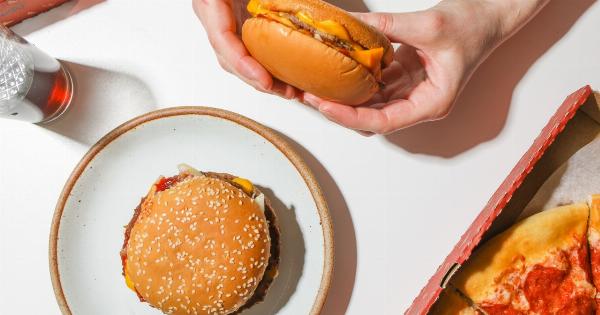Most of us have experienced the feeling of sluggishness and lack of energy after eating certain foods. Unhealthy eating habits not only leave you feeling lethargic, but they can also lead to weight gain and other health problems.
Here are 30 unhealthy eating habits that can zap your energy:.
1. Skipping Breakfast
Breakfast is the most important meal of the day. Skipping it can leave you feeling tired and listless for the rest of the day. Make sure to eat a healthy breakfast to kickstart your day.
2. Overeating
Eating until you’re stuffed can leave you feeling bloated and lethargic. Stick to smaller portions and eat slowly to give your body time to digest the food.
3. Eating Processed Foods
Processed foods are often high in salt, sugar, and unhealthy fats. They can leave you feeling tired and low in energy. Try to eat whole foods instead.
4. Eating Late at Night
Eating late at night can interfere with your sleep and leave you feeling groggy the next day. Try to eat your last meal at least a few hours before bed.
5. Drinking Too Much Alcohol
Alcohol can leave you feeling tired and dehydrated. It’s important to drink in moderation and to stay hydrated by drinking plenty of water.
6. Eating Too Much Sugar
Sugar can cause your blood sugar to spike and then crash, leaving you feeling tired and moody. Try to limit your sugar intake and opt for natural sweeteners like honey or maple syrup.
7. Drinking Soda
Soda is high in sugar and can cause you to crash and feel tired. Opt for water or herbal tea instead.
8. Eating Too Fast
Eating too quickly can cause you to swallow air, leading to bloating and discomfort. Try to eat slowly and savor your food.
9. Not Drinking Enough Water
Dehydration can leave you feeling tired and lethargic. Make sure to drink plenty of water throughout the day.
10. Skipping Meals
Skipping meals can cause your blood sugar to drop and leave you feeling tired and irritable. Make sure to eat regular meals throughout the day.
11. Eating Too Many Carbs
Carbs can give you a quick burst of energy, but eating too many can leave you feeling tired and sluggish. Stick to complex carbs like whole grains and vegetables.
12. Eating Too Much Fast Food
Fast food is often high in salt, sugar, and unhealthy fats. It can leave you feeling tired and bloated. Try to avoid it whenever possible.
13. Not Eating Enough Protein
Protein is important for building and repairing tissues in your body. Not eating enough can leave you feeling weak and fatigued. Make sure to eat protein-rich foods like meat, fish, and beans.
14. Eating Too Many Fried Foods
Fried foods are often high in unhealthy fats that can leave you feeling tired and sluggish. Opt for grilled or baked foods instead.
15. Eating Too Many Dairy Products
Dairy products can be high in fat and calories, which can leave you feeling bloated and lethargic. Try to limit your intake of cheese, milk, and other dairy products.
16. Eating Too Much Red Meat
Red meat is high in saturated fat and can be difficult to digest, leaving you feeling tired and uncomfortable. Try to limit your intake and opt for leaner meats like chicken and fish.
17. Not Eating Enough Fruits and Vegetables
Fruits and vegetables are packed with vitamins and minerals that can help boost your energy levels. Make sure to eat a variety of colorful fruits and vegetables every day.
18. Eating Too Many Salty Foods
Salt can cause you to retain water and feel bloated and uncomfortable. Try to limit your intake of salty foods and opt for herbs and spices to flavor your meals instead.
19. Not Eating Enough Fiber
Fiber is important for digestion and can help keep you feeling full and satisfied. Make sure to eat plenty of fiber-rich foods like whole grains, fruits, and vegetables.
20. Eating Too Many Snacks
Snacking can be a healthy habit, but eating too many snacks can lead to weight gain and leave you feeling tired and sluggish. Try to limit your snacking to healthy options like fruits, nuts, and vegetables.
21. Eating Too Many Processed Meats
Processed meats like deli meats and hot dogs are often high in sodium and nitrates, which can leave you feeling bloated and uncomfortable. Opt for fresh meats whenever possible.
22. Not Eating Enough Healthy Fats
Healthy fats like those found in nuts, seeds, and olive oil can help keep you feeling full and satisfied. Make sure to include healthy fats in your diet to help keep your energy levels up.
23. Eating Too Many Caffeinated Beverages
Caffeine can give you a quick burst of energy, but drinking too much can leave you feeling jittery and anxious. Try to limit your intake and opt for decaf or herbal tea instead.
24. Eating Too Much Salt
High levels of salt can leave you feeling bloated and uncomfortable. Try to limit your intake of salty foods and opt for herbs and spices instead.
25. Not Eating Enough Iron
Iron is important for energy production and can help prevent anemia. Make sure to eat iron-rich foods like spinach, beans, and red meat.
26. Eating Too Many Processed Grains
Processed grains like white bread and pasta are often low in fiber and can cause your blood sugar to spike and then crash. Opt for whole grains instead.
27. Eating Too Many Sweets
Sweets can give you a quick burst of energy, but eating too many can cause your blood sugar to spike and then crash, leaving you feeling tired and irritable. Try to limit your intake and opt for natural sweeteners like honey or maple syrup.
28. Not Eating Enough Vitamin D
Vitamin D is important for bone health and can also help boost your energy levels. Make sure to get enough by eating foods like salmon, eggs, and fortified milk.
29. Eating Too Many Processed Snacks
Processed snacks like chips and crackers can be high in salt and unhealthy fats, leaving you feeling bloated and sluggish. Opt for healthier snack options like fruits, vegetables, and nuts.
30. Not Eating Enough Magnesium
Magnesium is important for muscle and nerve function and can also help boost your energy levels. Make sure to eat magnesium-rich foods like spinach, almonds, and avocados.





























